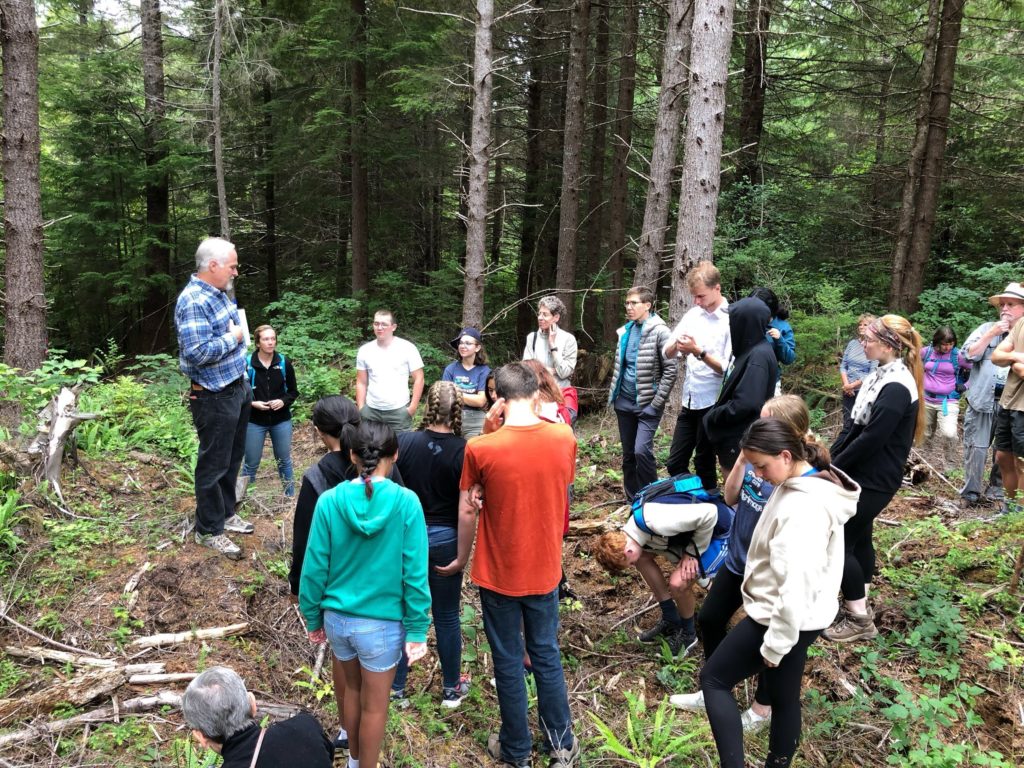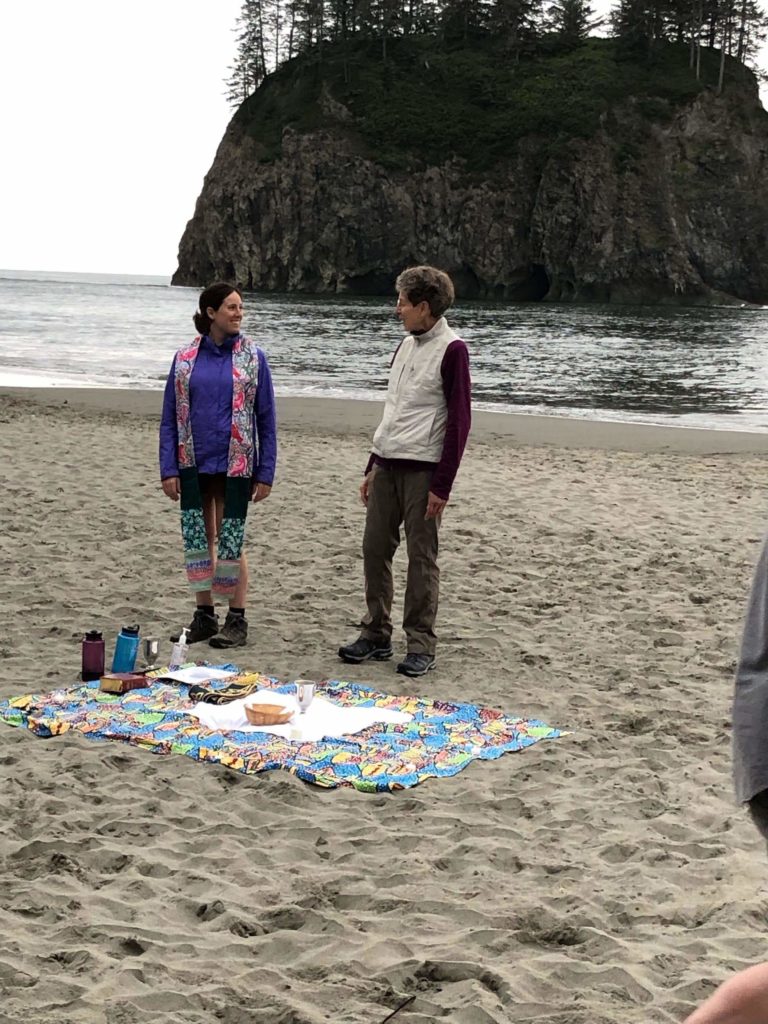Last night was the first where everyone slept outdoors. We woke up today in tents or on the grass, surrounded on all sides by a dark wall of woods. Tuck made us all aware of the life beneath our feet—tree roots searching through the dirt, communicating to each other through a vast fungal web—so you’d occasionally see a pilgrim running their hands along the grass while they packed their things and ate breakfast. We were aware of the woods. How aware were the woods of us?
Morning prayer involved some cheap, severely out-of-tune flutes acquired from a gas station the previous day. They made the music cheerfully wretched, which we liked. Our singing, unintentionally morose, was peppered with bursts of laughter.
Today’s trek took us to Lake Crescent, along an old railroad grade path that wound along its edge. Bill Harper—our newest companion—challenged us to walk the first mile in silence and listen to the sounds of the forest. We also went in with a metaphor given to us by Tuck: to walk as if our feet were “kissing the ground.” Wind, birdsong, and tree creaks surrounded us. At one point, we spotted a woodpecker clinging to the trunk of a tree. It hopped and flew from branch to branch, keeping an eye on us while we kept ours on it. Lake Crescent was such a rich, teal blue that it seemed to glow where it sat to our left.
The hike today was amazing. It was filled with joy and laughter and love. Reflecting on what Tuck had told us the night before made us feel so much more grounded. From singing songs to conversing with fellow pilgrims, we all felt a closeness to each other and to earth herself. As we were walking we saw what was called “Devil’s Punch Bowl.” We quickly learned that the reason for the naming was because of the temptation that we all felt to leap into it despite the five miles we still had left to hike. Later on the trail we came across a tree on the side of a cliff. The roots of this tree were so powerful that it was able to change the geology of the cliff completely. We stopped and ate a snack on a dead tree. It was wondrous to see that the tree was able to provide habitat for all creatures from moss to insects even while dead. We eventually got back to the vans and all piled in like sardines. We were as close as sardines physically, but also mentally and emotionally.
Michael Soran

A reflection of the hike is beyond my explanation. I can’t really recreate and write down what I experienced, but I didn’t think I would be this impacted at all by a hike. Bill kept mentioning how beautiful it was and really wonderful and that was supposed to make an impact. But I genuinely found myself opening my eyes wider and thinking deeper when I looked up. I was genuinely away from my anxiety and present in the moment for the first time in years. I was not aware of anything but nature— whether it was the eruption of beauty and delicacy, or just something I found in myself in that moment. It was powerful and moving and something I hope I can hold onto forever.
Beth Fairbrook
After the hike, we drove to the University of Washington Olympic Natural Resources Center (ONRC). The ONRC is pioneering a new forest management process called ethnoforestry, which combines forest management practices with the traditional ecological knowledge of local people.
Bernard Borman took us into the woods near the ONRC facilities. We stood on ground soft with decaying branches and pine needles, surrounded by youthful trees—none more than thirty-five years old. He taught us how to identify hemlock, sitka spruce, Douglas fir, vine maples, and alder. The crew there was experimenting with a new system of cutting trees; thinning more, they learned, allowed for more understory to grow between the trees. As a result, the trees grew bigger, and the additional space allowed more plants to bloom from the earth for animals like elk to munch on. The gathered wood is then sold to placea like Home Depot, and the profits funnel into the education system.

The day ended at Second Beach by La Push. The sun had begun to set just as we arrived, pouring over us in thick, orange light. Katharine and Sarah encouraged the pilgrims to reflect on what gave them hope; the restoration of the Elhwa river, the scientists we met working tirelessly to heal the earth, and, of course, new friends all made the list. After the reflection, we celebrated Eucharist. Katharine spoke powerfully while the waves roared behind her. We all wished each other peace, hugged our new friends (more than a few of us were moist in the eyes), and settled around a fire to sing some of our favorite songs from the week. The flutes, thankfully, were absent. The laughs, thankfully, were not.




Tonight, we’re sleeping at St. Swithin’s, Forks. They’ve been generous hosts to us: feeding us (another) delicious dinner between events and opening their doors to our sweaty bodies and abundant luggage. We continue to encounter such remarkable displays of loving service throughout this trip. For that, we cannot express our gratitude enough.

You are such a natural – Thanks so much for sharing
Thank you, Josh, for preserving these memories. This week was the best of my life; I learned so much about the Earth, myself, and the people around me. Thank you, thank you, thank you!